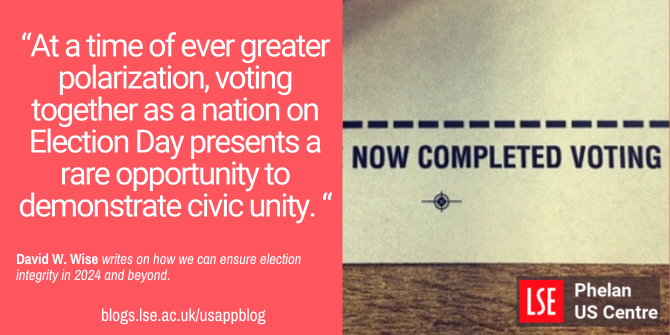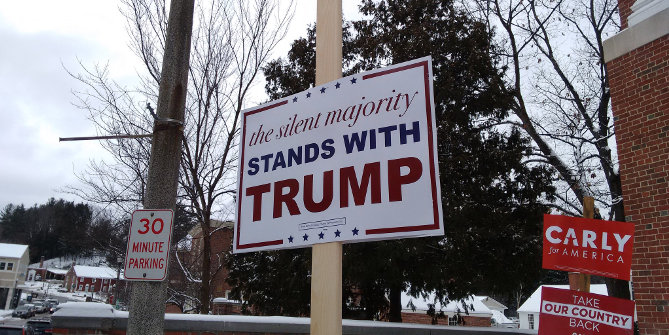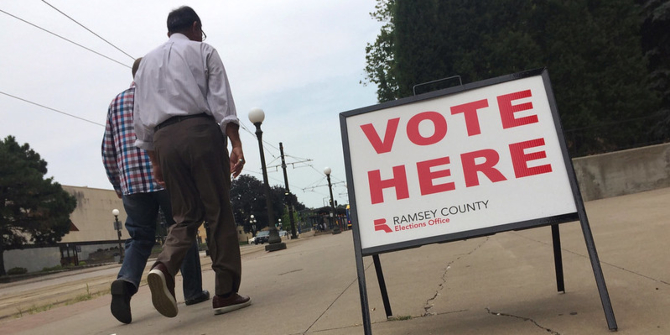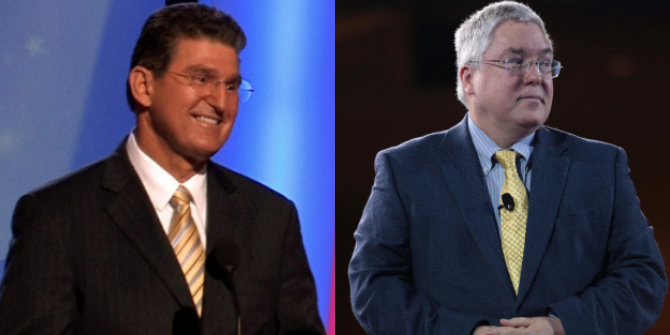 Recent years have seen a decline in the public’s trust in the integrity of US elections. David W. Wise gives an overview of why this trust may be falling and suggests ways that to increase public confidence in the integrity of elections ahead of the 2024 presidential contest.
Recent years have seen a decline in the public’s trust in the integrity of US elections. David W. Wise gives an overview of why this trust may be falling and suggests ways that to increase public confidence in the integrity of elections ahead of the 2024 presidential contest.
Confidence in the integrity of American elections has been on the decline. The legitimacy of the winner of three of the past six elections has been in dispute. Although polls reflect that these doubts are more pronounced among conservatives, two of the three elections called into question have been done so by Democrats (2000, 2016). Unfortunately, it has been clear for some time that the 2024 election will be the most divisive since the Tilden Hayes election is 1876 over a century ago.
The 2000 election came down to just 537 votes out of over 105 million cast. The lack of uniformity and flaws in the voting systems in Florida and the subjective judgments about which ballots were defective (the so-called hanging chads) left the outcome of that election undecided for 35 days until a ruling by the Supreme Court to halt the recount awarded the election to George W. Bush.
Revisiting 2016
In the years that followed the 2016 election, Hillary Clinton called the results into question due claims of foreign interference. But Russian President Vladimir Putin did not make Clinton take three “blue wall” states for granted (two of which had Democrats as chief election officials). And Putin did not tell Clinton to run an unauthorized private server during her tenure as Secretary of State, which blew up politically days before the election when the FBI announced that it was reopening its investigation.
Three years after his election defeat, Donald Trump still alleges that he was the victim of widespread fraud, despite losing 61 different court challenges, with some rulings being made by judges he appointed.
Voting reforms for electoral integrity
Following the chaotic 2000 election, a Commission on Electoral Reform was created headed by former President Jimmy Carter and former Secretary of State James Baker. President Carter was particularly qualified to serve on this commission as he has served as an outside observer on 113 international elections.
The Commission sought to strike a balance between voter access and election security. One of the recommendations was to use the REAL ID system as one means of protecting against voter fraud. It also encouraged expanded access to early in person voting, while building additional safeguards to protect the integrity of mail in voting, such as outlawing the practice known as ballot harvesting where the risk of fraud is highest. In addition, it also recommended a verifiable paper trail for each ballot.
In 2022 the Democrats in Congress attempted to pass the “The Freedom to Vote Act,”` aimed at overcoming what they claimed was a pattern of voter suppression and to fill gaps left by the weakening of the Voter Rights Act of 1965 by recent Supreme Cout rulings. Opponents claimed that the bill was an unconstitutional attempt to “nationalize” elections, and a power grab by one party. The bill failed to pass due to a Senate filibuster.
Voter suppression of African Americans has been pervasive throughout American history, although ameliorated by the 1965 Voting Rights Act. Over the past five national elections, the gap between Black and white turnout in the eight states most likely to be subject to the Voters Right Act has widened with each election, as has been the case nationally. On the other hand, African American turnout in 2020 as a percentage was higher than in 2016 and 10 percent higher than in 2000.

“Absentee ballot, submitted” by kaythaney is licensed under CC BY 2.0
Conservative opposition to Democratic measures to make voting easier
The Democratic Party’s, opposition to voter ID, push for mail in balloting and experimentation with non-citizen voting in local elections does nothing to allay conservatives’ concerns about election integrity. California, where 87 percent voted in 2020 by mail and which has one fifth of the Electoral Votes needed to win, ranks 49th on the conservative Heritage Foundation’s scoring of election integrity. The Biden administration’s secretive plan to use federal agencies to “get out the vote,” clearly a political activity, has also alarmed conservatives.
Although mail in voting was expanded in reaction to the unprecedented pandemic emergency, those measures should be treated as temporary. As laudable a goal of greater voter participation, and it is laudable, it is not possible to tighten election security in one area by opening the window wide in another. The mass mailing of ballots, whether requested or not, seems fraught with at least the perception for abuse. Mass mailing of ballots to an improperly vetted list treats voting as too casual, than as the act of an informed citizenry.
At a time of ever greater polarization, voting together as a nation on Election Day presents a rare opportunity to demonstrate civic unity. And the return date for ballots of those who must vote absentee for valid reasons should be received so that election returns can be announced on Election Day night. Votes lagging in for days and weeks does nothing to promote confidence in election outcomes. Accordingly, Election Day should be observed as a national holiday.
A REAL ID solution?
REAL ID verification, as recommended by the Carter Baker Commission, but modified to include proof of citizenship, including for mail in ballots, would provide a good foundation for electoral reforms. Many opponents of photo ID make condescending comments about the ability of certain demographic groups to get photo IDs. 81 percent of Americans support voter ID, with clear majorities across ethnic groups. 95 percent of whites and 87 percent of African Americans possess photo IDs. Programs to get a free REAL ID to anyone who wants one could be implemented. Photos IDs are required to cash a check, get a prescription, buy alcohol or cigarettes, or apply for social welfare programs. Photo IDs are required to fly, and even to buy an Amtrak ticket from Wilmington, Delaware to Washington, DC.
- Please read our comments policy before commenting.
- Note: This article gives the views of the author, and not the position of USAPP – American Politics and Policy, nor of the London School of Economics.
- Shortened URL for this post: https://wp.me/p3I2YF-dLi






